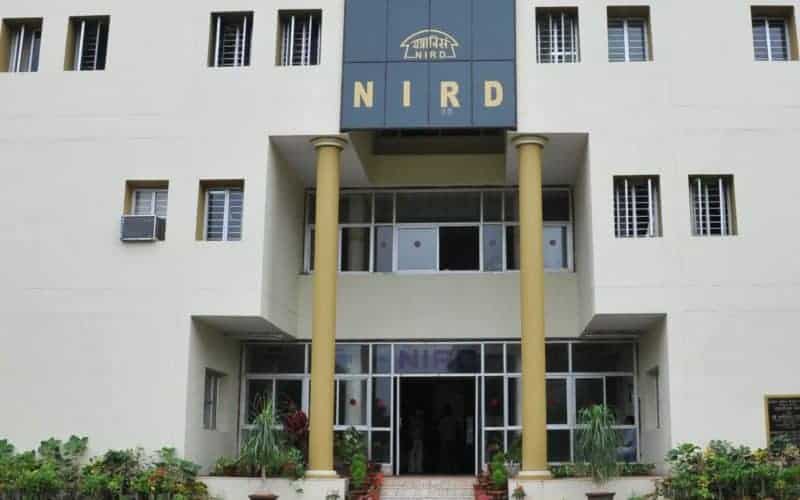Hyderabad: Manual scavenging is present in some pockets of the country where it is going unnoticed, said a group of women manual scavengers from Nagpur, Maharashtra, who were engaged in the occupation.
They narrated their stories as they visited National Institute Rural Development and Panchayati Raj (NIRDPR), Hyderabad, for attending a three-day exposure-cum-training programme on ‘Alternative Livelihood Opportunities’ for women who have left manual scavenging with the help of ‘Janjagriti Aawahan Bahuuddeshiya Samiti’, an organization working to uplift manual scavengers in Nagpur, Maharashtra.
These women belong to Mehtar (Bhangi) community that used to take up the cleaning of toilets in the country. Casteism within the community keeps issues affecting manual scavengers on the sidelines. They have undergone a lot of discrimination on the basis of caste and their livelihood. Earlier, they used to pick up human waste with bare hands.
They look for opportunities where diversified livelihood options are available so that they can learn those required skills and can start their own works.
Speaking about the importance of this training program and the outcomes, Dr. Lakhan Singh, Assistant Professor, and Course Director, Centre for Human Resource Development (CHRD), School of Development Studies and Social Justice, NIRDPR, explains, “To eliminate manual scavenging from society it is necessary that the MS Act 2013 and Swachh Bharat mission should be implemented in its true spirit. The manual scavengers should have easy access to diverse livelihood skills options suited to their needs such as those that NIRDPR has provided them during the three days training program. Also, human intervention in cleaning-related works have to be minimized and replaced by machines to bring dignity to this profession.”
The following are the experiences of the women manual scavengers:
1. Preeti Predeep Hajare, aged 33 years
Preeti Pradeep Hajare was born into a family of manual scavengers. Her parents were involved in the cleaning of dry latrines in the locality. They were barely making any income by working as manual scavengers. Preeti had to help her mother at a very young age, while she was in school. She went to the same school where her parents were working.
When her mother did not turn up for work due to ill health Preeti was coerced by teachers at the school to replace her mother and clean the toilets. Preeti was born into poverty and her parents could not afford her higher education. To fund her education, she started taking tuitions for children younger to her, taught dance and sold her own poetry.
In an instance, a teacher reprimanded Preeti for winning first prize in a poetry competition in school and questioned her intention of pursuing education as the teacher believed it was of no use to her. She faced many such backlashes from her teachers and friends in school.
Braving all the odds and with the support of her father, Preeti completed her education and started working for an NGO. She got herself enrolled in a Master’s programme and has completed three such programmes till day. Now, she is a mother of two children and works along with her husband for the upliftment of the fellow community members under ‘Jan Jagruti Ahwan Samiti’.
2. Pradeep Balwant Hajare, aged 34
Pradeep Balwant Hajare hailing from Nagpur has been a member and active participant with ‘Jan Jagruti Ahwan Samiti’. Her father was a small-time employee in the medical college and her mother was into manual scavenging. Pradeep used to help her mother daily before and after school.
The practice continued until her Bachelor’s program. Pradeep never felt that she was doing dirty work then, it struck her when she realised that she was being ill-treated and look down upon in the college, by her classmates and society.
During her Bachelor’s, she attended a conference at Nagpur on the condition of manual scavengers in India. This was a turning point in her life. Since then she started objecting the manual scavenging work. She started working as a Life Insurance Advisor and supported the household, made her mother quit the work. She has been working for the cause and established a school in the locality. The society now has a building which was constructed with financial support from donors.
3. Ganga Khare, aged 22
Ganga Khare’s parents were into manual scavenging. She completed her 10th class and helped her parents during school. While at school, she used to face discrimination from fellow classmates, who never shared food with her and called her the daughter of a sweeper.
While being ill-treated, she had been raising many questions as to why she had to go through such discrimination and no one answered her questions. She was given water in plastic cups and was often ill-treated because of her caste.
She never got any other opportunities, as she comes from a community of ‘Bhangi’. Later, she came to know about ‘Jan Jagruti Ahwan Samiti’, where she learned about the nursing program. Now she is working as a nurse and making a decent living.
A total of 17 women from Nagpur along with their two community leaders undergo in the training during this workshop.
At the end of the program, participants had learned at least one livelihood skill and had exposure on other livelihood options available for them. The participants felt rejuvenated and motivated after attending this program. All the participants have liked this program and demanded many more programs for themselves, other women, youths and adult males of this community.

